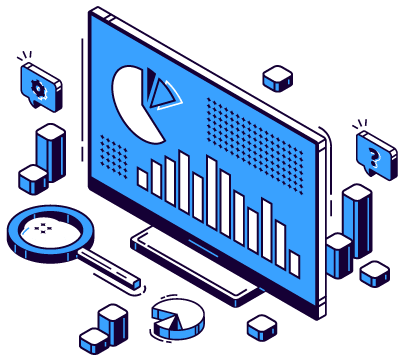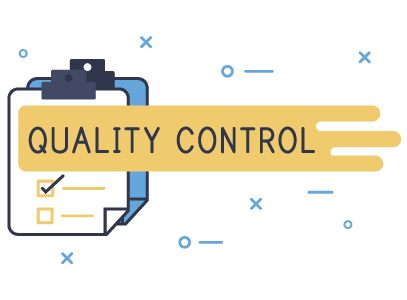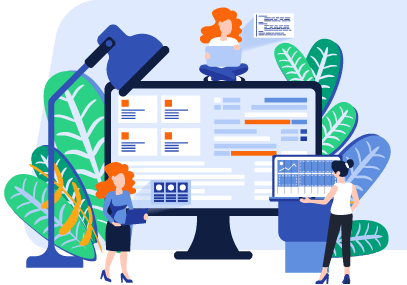Do you think the effective business management procedure of a “mom and pop shop” will be anywhere close to that of an “enterprise”? Rolling eyes on that is legit !
Well on that note, there remains no more doubt on the fact that “an enterprise requires an enterprise application & an enterprise application is a LOT different from that of a regular application”. (HOWs and WHATs ahead!)
Pretty obviously, when your business extends its reach to a bigger market size, the processes involved become more complex and tend to consume more time and money, while attempting to continue manually. Especially in today’s world, where children don’t wait for their kindergarten instructor to teach them their next rhyme & turn to an AI driven learning program on their ipad instead!
On a conceptual level, an Enterprise Application acts as a sharp edge while your enterprise drives itself into the ground. Practically, starting from a moderately big organization to a “Fortune 500”- scaling up is no low-hanging fruit to any. The challenges during the growth phase are many and the solutions are mostly mind-numbing and that’s precisely what the point of enterprise software development is, fixing most of such loopholes.
What is Enterprise Application?
Enterprise applications, as the name suggests, are applications built to satisfy the requirements of an enterprise, rather than focusing on personal usage. Technically, enterprises can be any big organization in general, be it schools, clubs, businesses or even governments. On a higher level, what an enterprise application does- it basically automates a number of operations running within an enterprise to enhance the overall business process.
To be precise, an enterprise system is put in charge of controlling critical business processes in real time as well as managing the relationship & interactions amidst suppliers, venture partners, customers and even remotely working colleagues in some cases, all located at different spaces.
Online payment management, interactive product recommendation, business content management, CRM etc. are some of the common examples of enterprise applications.
Consumer Application Vs. Enterprise Application – What’s the difference?
In today’s date, when kids can easily read out ‘A’ for ‘App’ instead of ‘Apple’, the concept of app doesn’t require any introduction, anymore.
However, enterprise application expands to mean more than just a regular application used for an enterprise and the differentiating factors lie in its characteristics.
Let’s have a quick look!

Not Your Over-Hyped Prisma Or, Pokemon Go
The name ‘enterprise application’ already tells us it’s strictly for enterprise usage and so, all its features are developed to serve specific work purposes.
Now the next obvious question is – how about facebook, twitter & apps alike that have managed their place in business space just as much as in personal front, or so-called work-oriented MS suite kind of apps that are being used personally too?
On that note, let’s conceptualize the distinguishing factors beyond iterations, core formats, or usage instances, more focused on the general traits over exceptions.
The perennial question here is, why does the enterprise applications pinch the pocket harder than the usual applications?
The answer is in the nitty-gritties of the application. Mostly the open source applications are offered in two ways :
- 1. Community Edition
- 1.1 Mostly free or charges a nominal fee
- 1.2 Generally contains dynamic code which can be modified without much effort
- 2. Enterprise Edition
- 1.1 Comparatively expensive and the fee includes maintenance and support charges.
- 1.2 The code is non dynamic in nature and can not be modified easily.
And if gone the best way and opted for custom software development following the best practices, the upfront cost will look big but the benefits you’ll get will be bigger.
Asking “Why?”
Because, it works exactly where your business needs to be worked on, to produce outcomes exactly aligned with your business goals..and many more reasons!
Precise Architectural Emphasis
An enterprise application, unlike a regular app, requires an advanced level of technical consideration in between the development and operation phases i.e. inclusion of the production state. The production phase gets the app ready to handle data overload, sudden scaling needs and many such possible disruptions.


Strict Auditing
The community app hardly has to generate reports for its users but it’s a mandate for an enterprise app. So unlike a regular app, an enterprise application passes through a more refining audit session to ensure the fed-in data is minutely checked before it’s used in business reports generation. Otherwise, there are high chances of faulty half-processed results damaging the business’s bottom-line.
Overall Quality Assurance
Reliability is another aspect that’s highly sought after in an enterprise application because of the critical data involved in its functioning. To make such apps more trustworthy, further-reaching, stable and also end-to-end encrypted, quality assurance as well strict testing is carried out.

Features of Enterprise Application
Enterprise application is quite steadily becoming a common part of almost every growing (smart) business organizations’ list of essentials. But, not all of them incorporate the right features into the application and that explains a lot about why not every enterprise application gives the enterprises the desired boost.
The next obvious question is, “What are those must have features?”
So, here’s the list:

Automation at its best
A well planned enterprise application development has immense power to enhance the bottom-line of the business by automating the entire workflow across the enterprise. Automation does not require rocket science, getting in touch with the right development partner does the trick.
Instead of randomly automating a bunch of tasks, first look at your existing business processes to identify the tasks that are killing most of your time. Because, parallely running some automated and some manual tasks can crash your system down, leave alone bettering it! So, take planned steps towards your enterprise app development and make sure the matter of extensive efforts and a considerable amount of planning time (and money, of course!), your enterprise application efficiently reaps what you sow.

Uncompromised Performance
Would you replace your macbook with a PARAM supercomputer? …it is loaded with features..still no?
Performance with respect to contemporary needs – that’s exactly what will stop you in the first place.
Looking at it from an enterprise perspective – all your investment into the enterprise application will go down the drain if you don’t have a clear understanding of how you want the application to perform. Simply because enterprise application is the digital counterpart of your business workflow & thus, what height your business would reach has a lot to do with your application’s performance!

Full Ownership
If the same strategy as that of the others in the similar business doesn’t fetch success, isn’t it really funny to think, using a similar enterprise application will? For sure, it is!
So make sure you don’t become one of those many, cookie-cutting their long-thought effective workflow into a generic one and regretting it sooner or later! Owning your enterprise application is not a ‘great idea’ for success, it’s a must-do. That way your application will not just solve your specific business problems in lightning-speed, but will also keep your USP intact.

Customized Or, Nothing!
Who has ever won Miss World title wearing a GAP tee?
Clearly none and that pretty much justifies the significance of customization to stand out.
So ‘customization’ is the way to go if you are not one who doesn’t mind shifting the effectiveness of business processes to the back-seat. Think of all your business nitty-gritties getting a digital platform with miniscule changes only for further betterment along with your consent – that’s an ideal custom enterprise application for you!

High scalability
When your business grows isn’t it a mandate that your system grows in sync..well, unless you’re ready to accept disruptions. Quite justably, for every smart business, growth is always on the cards and thus scalability is another feature that has serious consequences, if overlooked. Make sure your enterprise application has ample scope to be scaled up in areas where business growth is expected, order processing module for example.

Integrations For Convenience
Let’s look at it with a familiar example:
Jack has joined a company as a new sales executive and he doesn’t play well with any of his colleagues from the sales team. So, to make him do his work, the CEO himself has to sit and discuss all the sales processes with Jack. Sounds unrealistic?
Now think of a new enterprise application that doesn’t talk to the existing applications which are in use for so long! Terrible..and enterprise application integration solves just that, ensuring your new enterprise application interacts with the existing applications that your team is used to, so that you don’t have to manually import/export data between multiple enterprise applications.

All Data In One Place Plus Latest Updates
If your enterprise application doesn’t curb your struggle of going “all-over-the-place” (read, systems), it’s not the best bet!
So, the enterprise applications should have a single access point for all the critical business data, with the latest updates. For instance, your accounts guy can get that info at just one click, without having to wait for the sales guy to come back with the desired input.

Tight Security and Robustness
Developing enterprise applications without proper security enforcement is like making an expensive building and leaving it unlocked.
Imagine all your features working on point.. but all your data leaking out..
..nothing less than a nightmare, undoubtedly.
That’s self explanatory.
So either you enforce well thought security measures or see your USP being theirs in 3…2…1 !
On the other hand, the application should be able to withstand sudden changes in business processes, if any occurs – thus, robustness.
4 Things You Should Know When Developing an Enterprise Application
To stay ahead of the rest in the contemporary market scenario, enterprises must ensure top-notch services to their clients and to attain maximum client satisfaction the enterprise needs to have an extremely efficient execution process in place first. An enterprise application can be that tech genie in need, but only if you train it err.. Develop it well.
Here’s what you need to keep in mind when you get your enterprise application developed!

Limit Features – Remember your enterprise application doesn’t need to serve other enterprise’s purpose(s)
You can not put whipped cream, choco chips, rainbow sprinkles in a pumpkin pie and hope it turns out better than ever, right?
Well, the same goes for enterprise applications – that implies, adding on features that have nothing to do with your business’s requirements will only be ‘junk’ & pull down efficiency if not worse. So, look for every aspect of your business that you think your application can improve but don’t add any function unnecessarily. In short, keep your goal clear and develop a simple & highly effective application.
Keep in mind your users’ convenience – a hungry man wants a fruit, not a map to reach some distant garden
The enterprise application is supposed to make your business processes easier, but developing it using the latest technologies & overlooking users’ convenience will only tangle them further. So, try putting yourself in the shoes of your users and incorporate the features that would make your app live up to the users’ expectations. That way, your app won’t just be adopted well within an enterprise, but will also fulfill the automation requirements of your enterprise while providing excellent user experience. For example, features like in-app notifications, offline functionality, multi platform support etc. are proven to impress users regardless how tech savvy they are.


Don’t lose vision of the context – your application should help the enterprise overcome real-time challenges, not quarantine itself from them
An enterprise application has very little worth unless it syncs with real-life data and analytics. Thus, losing context while focusing on features (quantitatively) will only deprive your enterprise app off its ideal cognitive analytical abilities. On a practical note, a contemporary enterprise has to deal with numerous stakeholders, ensure all the processes are using resources optimally and keep an eye on the offerings’ quality at every point in time. Processing such humongous information clearly needs a steady management system, and along with a real-time data analysis module embedded in, critical decisions can be more factual than ever – catering to the enterprise’s future growth without the decision makers breaking much of a sweat.
- Sending product / service information to the customers over varied channels (social media, phone, email, digital ads etc.)
- Sending promotional offers
- Segment your list of existing and potential customers and design & schedule targeted marketing campaigns
- Notify you regarding customer’s interest
A marketing automation software can put the best of technical enhancements to use, to carry out your long-practised marketing process with higher accuracy and efficiency. So, your team can concentrate on developing great content and setting ambitious strategies for business growth.
Being Tight on Budget Implies Compromising With Effectivity & Efficiency
Last but not the least, budget – while setting your budget for your enterprise application, make sure you prioritise efficiency above anything else. Honestly, you can either stick to the objective of
(A) ‘saving as many bucks as you can’
or,
(B) or ‘getting hands on the best performing application for your business’ ..never both !
While choosing (B) implies slightly higher upfront expense and assured top-notch performance, going for (A) is sure to cause significant delays and interruptions in your business processes further leading to dollar drainage.
As you know, silver (add ‘bullet’ for relevance) doesn’t come for the price of foil. Choice, however, is yours.
As you know, silver (add ‘bullet’ for relevance) doesn’t come for the price of foil. Choice, however, is yours.

Featured Projects
More Projects…
FAQs
That’s why BinaryFolks divide enterprise software into four categories:
Small Enterprise Software: It specifically refers to the software which is built for small business owners to replace their day-to-day business process with minimum automation. This kind of software will cost you around $10k – $50k.
Medium Enterprise Software: This kind of software could have a decent amount of functionalities, integration with few third party platforms or could have other productivity-enhancing features etc. Which will cost you between $50K-$100K
Large Enterprise Software: This segment covers the most of the “Enterprise Level” need. A large enterprise software could have a whole lot of complex functionalities, integrated with Enterprise Resource Planning(ERP) , Customer Relationship Management(CRM), Human Resource Management Systems(HRMS), and a lot more. This will cost you around $100K to 500K
Extra Large Enterprise Software: As a “check” of an extra large enterprise company, they could have more than 5000 employees, they could have more than 1.5 billion dollar annual turnover! So the size of the company is outlining the requirement of the robustness and scalability of the software! An Extra Large Enterprise Software could have their native ERP, CRM, HRMS, accounting software and many more custom inbuilt features. This could cost between $500K – $1M and beyond.
Certainly, the requirements influence the Custom Enterprise Software Cost the most.
Enterprise Resource Planning(ERP)
Customer Relationship Management(CRM)
Supply Chain Management (SCM) Systems
Content Management System(CMS)
You can read one of our articles where we have listed 10 enterprise applications that every business owner should take into consideration.
Enterprise application, on the other hand, is specifically built for the enterprises or business to manage and optimize their operations allowing them to save time and money along with increasing efficiency and productivity.





